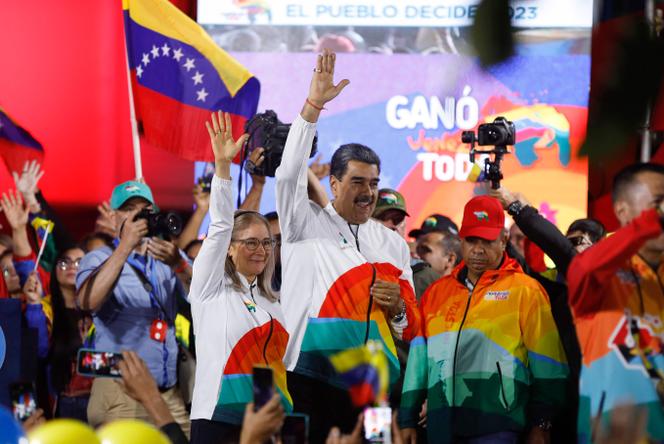


The "Yes" side won a "clear and overwhelming" victory. At 10 pm on Sunday, December 3, the president of Venezuela's National Electoral Council (CNE), Elvis Amoroso, summed up the results of the consultative referendum held on Essequibo, the oil- and mineral-rich region administered by neighboring Guyana, which has been claimed by Caracas for almost two hundred years. Over 95% of Venezuelans answered in the affirmative to the five questions put to them. Immediately, President Nicolas Maduro congratulated himself on election day, declaring it "a total success for our country, for our democracy."
In a first election report, Amoroso indicated that voter turnout was around "10,431,907" votes. The number of voters called to cast their ballots was some 20.7 million, and the CNE said about 50% of voters had turned out.
Throughout the day, in a country accustomed to long queues at every poll, the electoral offices seemed to be sparsely populated. In front of the cameras, supporters of Venezuela's Chavista regime – civil servants, journalists and voters – explained that the procedure was extremely rapid this time, without convincing anyone.
At the end of the day, the CNE postponed the closing of polling stations by two hours "to cope with the massive turnout" – Venezuelan law stipulates that they must remain open as long as voters are present – but foreign television footage has contradicted this assertion.
"The question arises as to whether the figure [of over 10 million votes] indicated by Mr. Amoroso corresponds to the number of votes cast for each of the questions, or whether it refers to the total number of votes cast," noted Luis Vicente Leon, president of the Datanalisis survey institute. This is an important distinction: In the first case, the turnout would be 50%, and in the second, only 10%. With the 2024 presidential election less than a year away, this referendum has taken on the appearance of a "test" for the government.
"Starting today we will emerge stronger as a country to speak clearly and powerfully. Venezuela’s voice will be one," declared the president as he opened the polls at Fort Tiuna, Caracas' military complex. Throughout the election campaign, Maduro repeatedly called for patriotism and unity. The Venezuelans indeed appear convinced that the Essequibo region belongs to them, but it seems that many of them did not go out to vote for that.
The consultative referendum has no international legal value, but the rhetoric from Caracas has worried Guyanese citizens. Essequibo's 159,500 km2 expanse represents two-thirds of the territory of this latter country with a population of less than one million. One of the questions asked on Sunday was whether Essequibo should be incorporated into the federal state of Venezuela.
You have 40% of this article left to read. The rest is for subscribers only.
